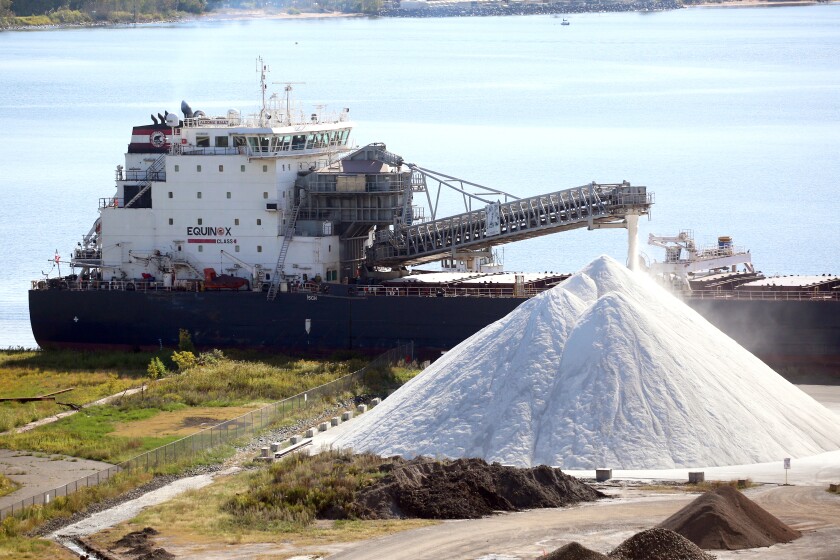DULUTH — U.S. Rep. Pete Stauber was named chair of the Energy and Mineral Resources Subcommittee earlier this month.
The subcommittee, under the umbrella of the House Committee on Natural Resources, has jurisdiction over energy production on federal lands, both on and offshore, including oil and gas drilling, mining and renewable sources like wind and solar.
ADVERTISEMENT
In an interview with the News Tribune last week, the Republican congressman from Hermantown outlined his goals for the subcommittee: oversight of the Biden administration and permitting reform.
Oversight and permitting reform
Stauber said he’s planning to use the committee to hold the Biden administration accountable for decisions that negatively affected the fossil fuel and mining industries.
Most notably: the Biden administration’s decision to ban new federal mineral leases on 225,500 acres of the Superior National Forest that share the same watershed as the Boundary Water Canoe Area Wilderness. It was the latest move by the administration that effectively killed Twin Metals’ plan to build an underground copper-nickel mine, processing facility and tailings storage facility there.
He said the subcommittee will hold hearings and request administration officials testify and explain to Minnesotans “why they chose the route they did and didn’t follow the facts, the science or the truth in their determination.”
That’ll happen “as soon as practical,” Stauber said.
He said the subcommittee will also conduct oversight on a number of other oil and mining projects affected by Biden administration decisions:
- The mine proposed in Arizona. In its final days in office, the Trump administration issued an environmental impact statement for the project, but that was rescinded six weeks later by the Biden administration for further review.
- The project, ConocoPhillips’ oil drilling project in Alaska. Early this month, the Biden administration signaled support for a scaled-back version, but remains concerned about the project.
- The exploration of oil in the Gulf of Mexico.
President Joe Biden, as a candidate, pledged no new drilling on federal land in an effort to curb emissions and fight climate change.
ADVERTISEMENT
But Biden’s first year in office saw the Bureau of Land Management approve more permits to drill oil and gas wells on public lands than the Trump administration’s first year in office, That pace slowed considerably in Biden’s second year in office, however.
more than 5,000 applications for permits to drill were pending at the end of January 2023.
“That’s simply unacceptable,” Stauber said.
Biden had also suspended the lease sales, but a federal judge ordered them to resume. Stauber said lease sales weren’t being done in a timely manner.
As a result, Stauber said, “We all pay higher price for our oil and natural gas and propane.”
There is no single reason oil prices have gone up since bottoming out early in the pandemic amid low demand.
And U.S. crude oil production is returning. This year could see the U.S. produce an average of 12.4 million barrels of crude oil per day, surpassing the record of 12.3 million barrels per day set in 2019, the
ADVERTISEMENT
Still, Stauber sees permitting reform for all natural resource industries as a key priority for the subcommittee.
Uncertainty in the permitting process is driving investment away, Stauber said. He wants to avoid the U.S. becoming more dependent on other countries for critical minerals, especially if they are adversarial or have poor environmental and child labor standards.
He pointed to his bill, the introduced last month. The bill would set environmental review deadlines to three years: one year for an environmental assessment and two years for an environmental impact statement. The bill allows for timeline extensions. It would also limit the window for legal challenges against the permit, among other changes.
“I believe the Permit for Mining Needs Act will get bipartisan support, and it’s going to come out of committee after a good, healthy debate,” Stauber said. “I really think it’s bipartisan because you need permitting reform if you’re going to install wind or solar. It shouldn’t take 10 or 15 years for projects to come online.”
But will there be bipartisanship on the subcommittee?
Earlier this month, Stauber’s campaign sent a fundraising email highlighting U.S. Rep. Alexandria Ocasio-Cortez’s role as the Democrat’s ranking member on the subcommittee.
The email called Ocasio-Cortez, a Democrat representing parts of New York City, “a left-wing climate activist trying to abolish America's domestic mineral and natural resource usage.”
ADVERTISEMENT
“Will you chip in $8 to help me protect District 8 from AOC (Alexandria Ocasio-Cortez) and other left-wing activists?” the email asked.
What about renewable energy?
Stauber originally told the News Tribune that his subcommittee didn’t have jurisdiction over renewables on federal land, saying that fell to the full House Committee on Natural Resources. But a spokesperson for his office, Eli Mansour, later clarified in an email that the subcommittee does, in fact, have jurisdiction over renewable energy production on federal lands.
Asked if Stauber had specific plans on renewable energy development on federal lands and whether the subcommittee would try to expand renewable developments, Mansour pointed back to permitting reform.
“The key to any energy development is permitting reform. Without this, it’s near impossible to develop new projects on federal lands,” Mansour said. ”Rep. Stauber looks forward to overseeing all topics within jurisdiction of the subcommittee, which include oil, gas, wind, solar and more.”
There is overwhelming consensus among scientists that humans burning fossil fuels have increased the levels of carbon dioxide and other greenhouse gases in the atmosphere, strengthening the greater greenhouse effect by trapping heat and slowing its release to space.
Increasingly, countries are quickly moving away from fossil fuels like oil, natural gas and coal to prevent warming the Earth more and to avoid some of the most catastrophic climate change effects. But the subcommittee is unlikely to push for that transition at the expense of the oil and gas industry.
Stauber, a member of the Conservative Climate Caucus, said the U.S. gas and oil industries have already taken a lead in reducing emissions and the rest of the world should follow suit.
ADVERTISEMENT
The Conservative Climate Caucus advocates for preserving the fossil fuels industry by using technologies to reduce the industry’s emissions.
The caucus does acknowledge humans’ role in climate change.
“The climate is changing, and decades of a global industrial era that has brought prosperity to the world has also contributed to that change,” the caucus says in the of its website.
But Stauber wouldn’t say he believes humans cause climate change.
“The fact of the matter is, we know that the climate had been changing for a lot of years, and the fact of the matter is, scientists have said the temperature of the Earth has risen and fallen over these billions of years,” Stauber said.
When pressed, Stauber said, “There’s still that healthy debate on that.”
But the , the and other agencies and research organizations are in agreement: Human activity has led to climate change.
Even s have known for decades that humans burning fossil fuels would lead to a warming climate.
ADVERTISEMENT
Up next
The Energy and Mineral Resources Subcommittee is scheduled to meet Tuesday to consider two bills: Stauber’s bill to shorten federal mine permitting and the Transparency and Production of American Energy Act of 2023.
A was introduced last Congress by Rep. Bruce Westerman, a Republican from Arkansas and the chair of the full House Committee on Natural Resources. It’s meant to “streamline permitting for energy infrastructure” and prevent presidents from withdrawing federal lands from oil, gas, coal, mineral and geothermal leasing without congressional approval, according to the text of the bill introduced last fall.
The subcommittee will consider the bills at 9:15 a.m. Central Standard Time in Washington, D.C. The meeting can be


























